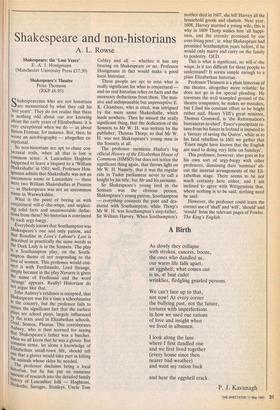Shakespeare and non-historians
A. L. Rowse
Shakespeare's Theatre Peter Thomson (RKP £6.95) Q hakespeareans who are not historians
are mesmerised by what they call his lost years'. They do not realise that there IS nothing odd about our not knowing about the early years of Elizabethans: it is very exceptional when we do — as about Simon Forman, for instance. But, then, he wrote an autobiography — altogether ex- ceptional.
So non-historians are apt to chase con- jectural trails, when all that is lost is Common sense. A Lancashire Hoghton happened to leave a bequest to a `William Shakeshafte' in 1581; well, Professor Hon- 'Mann admits that Shakeshafte was not an uncommon name in Lancashire — there Were two William Shakeshaftes at Preston as Shakespeare was not an uncommon name in Warwickshire.
What is the point of boring us with conjectural will-o'-the-wisps, and neglect- ing solid facts and unanswerable deduc- tions from them? No historian is convinced by such argy-bargy. Everybody knows that Southampton was Shakespeare's one and only patron, and
that Rosaline in Love's Labour's Lost is
described in practically the same words as the Dark Lady is in the Sonnets. The play is a Southampton play, on the South- anipton theme of not responding to the love of women. This professor would con- nect it with Ferdinando, Lord Strange, simply because in the play Navarre is given the name of Ferdinand and the word 'strange' appears. Really! Historians do not argue like that. . John Aubrey's evidence is accepted, that S. hakespeare was for a time a schoolmaster
lb the country, but the professor fails to
notice the significant fact that the earliest Plays are school plays, largely influenced °Y the texts used in Elizabethan schools,
Ovid, Seneca, Plautus. This corroborates Aubrey, who is then scorned for saying that Shakespeare's father was a butcher, When we all know that he was a glover. But en„ Mmon sense, let alone a knowledge of thzabethan small-town life, should tell °ne that a glover would take part in killing the animals whose skins he needed.
„ The professor disclaims being a local nistorian, but he has put an immense lihMount of research into the detailed family t!storY of Lancashire folk — Hoghtons, 'leakeths, Savages, Stanleys, Uncle Tom
Cobley and all — whether it has any bearing on Shakespeare or no. Professor Honigmann in fact would make a good local historian.
These people are apt to miss what is really significant for what is conjectural — and no real historian relies on facts and the necessary deductions from them. The mas- sive and indispensable but unperceptive E. K. Chambers, who is cited, was intrigued by the mere name Shakeshafte, which leads nowhere. Then he missed the really significant thing, that the dedication of the Sonnets to Mr W. H. was written by the publisher, Thomas Thorp; so that Mr W. H. was not Shakespeare's young man in the Sonnets at all.
The professor mentions Hasler's big official History of the Elizabethan House of Commons (HMSO) but does not notice the significant thing again, that throws light on Mr W. H. Namely, that it was the regular rule in Tudor parliament never to call a knight by his title, but Mr and his surname.
So Shakespeare's young lord in the Sonnets was the obvious person, Shakespeare's young patron, Southampton — everything connects the poet and dra- matist with Southampton; while Thorp's Mr W. H. was Southampton's step-father, Sir William Harvey. When Southampton's
mother died in 1607, she left Harvey all the household goods and chattels. Next year, 1608, Harvey married a young wife; this is why in 1609 Thorp wishes him `all happi- ness, and the eternity promised by our ever-living poet', ie. what Shakespeare had promised Southampton years before, if he would only marry and carry on the family to posterity. QED.
This is what is significant, no will-o'-the wisps. Is it too difficult for these people to understand? It seems simple enough to a plain Elizabethan historian.
Professor Thomson is a plain historian of the theatre, altogether more reliable: he does not go in for special pleading. He traverses the well trampled ground of the theatre companies; he makes no mistakes, but I find his constant effort to be bright rather naif. Henry VIII's great minister, Thomas Cromwell, is 'the Reformation's bureaucrat-in-chief'. Essex's precipitate re- turn from his fiasco in Ireland is imputed to a `fantasy of saving the Queen', while as to his fatal rebellion in 1601 we gather that 'Essex might have known that the English are used to doing very little on Sundays'.
This professor, however, also goes in for his own sort of argy-bargy with other professors, dismissing their 'surmises' ab- out the internal arrangements of the Eli- zabethan stage. There seems to be not much certainty here either, and I am inclined to agree with Wittgenstein that, where nothing is to be said, nothing need be said.
However, the professor could learn the correct use of 'shall' and 'will', 'should' and 'would' from the relevant pages of Fowler, The King's English.














































 Previous page
Previous page